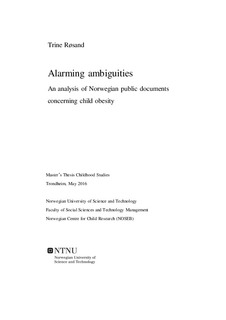Alarming ambiguities : an analysis of Norwegian public documents concerning child obesity
Abstract
In the public domain, overweight and obesity are usually presented as an alarming health
problem in need of fixing. There has been an increase in average body weight in many counties
across the world in the last 30 years. The reasons for this are numerous, and rest both in modern
society, biology and personal lifestyles. Responsibility for altering the situation is also divided.
The societal responsibility frame identifies it as society’s job, while the personal responsibility
frame defines it as individual’s obligation. At the same time concerns around problem
formulation, reasoning and responsibility to a broader extent are diverse and less obvious.
Similarly, there are many perspectives and assumptions concerning children.
This study has looked at how overweight and obesity are understood and handled by the
Norwegian Government and health authorities, and what ideas about children they rely on.
Theoretically, this study has been informed by social studies of children and childhood, and
sociology of health and illness. The method of document analysis has been used, and ten public
documents giving premises for the Norwegian health care service were analyzed using thematic
analysis. The child perspectives and understanding a phenomenon have been main perspectives
in approaching the documents.
Findings from the study show that the documents rely on a certain hegemonic ideology
concerning excess body weight, constructing it as a great problem. Main reasons are said to be
a modern health debilitating society, and individual lifestyle behavior in terms of physical
activity and diet. The responsibility is placed mainly on society, and societal solution proposed
to handle the problem are changing personal behavior, regulating societal structures and
prevention efforts. Children are positioned both as competent and dependent, within a landscape
of various views focusing mainly on children’s significance as future human beings. However,
an important finding was the alarming ambiguities concerning both in the formulation of the
“obesity problem”, the logic behind it and the construction and positioning of the child.
Reliance lies on the ideology of overweight as inherently health hazardous, which together with
simple explanatory frames may allow for moralizing behaviors in society towards overweight
and obese individuals. Society’s role in maintaining health in the population can cause
pedagogies about the self being imposed on and affecting people. The ambiguous construction
of children in society, and of overweight and obesity may lead to difficulties in implementing
appropriate measures in handling the situation. There is a need for more research from social
sciences, focusing on what the problem is presented to be.
